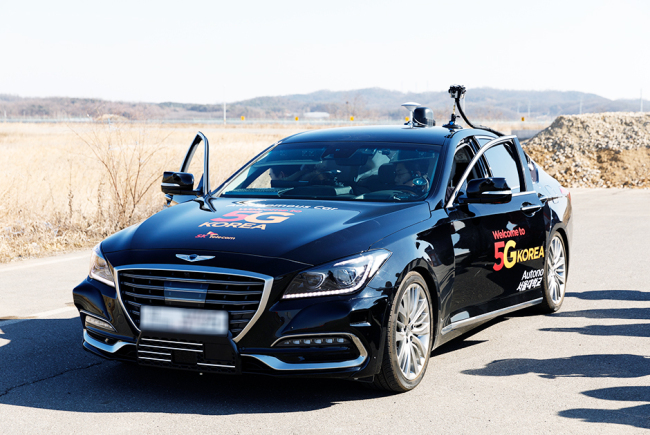Mobile & Internet
Will 5G era really revolutionize the world?
Consumers will soon be inundated by marketing schemes and telecom jargons for the next-generation network 5G by mobile carriers and handset makers, including Samsung Electronics and LG Electronics who will churn out 5G-enabled smartphones from late this month in earnest.
As usual, some consumers will be bewildered by the new technology in the beginning partly because they are unfamiliar with the term itself and are probably unsure about whether a 5G phone is worth the money.
It is often said that the 5G services could open up the doors to a host of new opportunities by making the world connected in a seamless manner through much faster and more efficient communications technologies. But what exactly is 5G good for?
 |
Theoretically, the 5G network pushes mobile speeds up to 20Gbps, which is nearly 20 times faster than the current 4G LTE network. It is expected to bring a range of benefits to different segments, including automotive and medicine sectors.
Since there is very little latency in transferring data, for example, the 5G network can be used in real-time communication between cars to improve safety without human intervention. Doctors can remotely monitor the status of patients or even carry out a surgery through 3D imaging systems on the network.
Despite the rosy picture painted by 5G supporters, it will take some time before people expeience these benefits.
In reality, 5G services will likely be much slower than the theoretical maximum of 20Gbps due to technical reasons.
“The speeds of initial 5G smartphone services would be around 1.3Gbps or slower because, among other reasons, frequencies allocated for the 5G network will not be fully utilized for a while and telecom chipsets will have limited capabilities,” an LG Uplus spokesperson said.
Therefore, the upcoming smartphones with 5G support, including Samsung’s Galaxy S10 variants and LG Electronics V50 will likely boast fast, but not that fast, download speeds.
The download speeds of LTE-based phones used to clock at some 70Mbps, now at 400-500Mpbs. The LG Uplus spokesperson said the 5G network speeds will improve in phases.
The 5G-powered smartphones are also pricier than LTE counterparts, which can become a hurdle for the next-gen network to go mainstream. LG Electronics CEO Kwon Bong-suk said in a press conference last week the price will play a vital role for 5G smartphones to take off.
“Most 5G smartphones will be priced above US$1,000, but global handset makers will likely try to launch them cheaper than US$1,000 in the second half to nurture the market,” the CEO said.
Despite the steep price tag, 5G smartphones will be optimal devices for users who heavily consume high-quality content and play high-resolution games.
 |
Mobile carriers have been launching a range of 5G services to attract new subscribers, and they are mostly focused on data-heavy online gaming or video streaming services, often utilizing the virtual reality technology.
Teaming up with game company Nexon, SK Telecom, the nation’s largest mobile network firm, will launch a VR version of once-popular racing game Kart Rider during the MWC trade show that kicks off on Feb. 25 in Barcelona.
KT, on the other hand, will showcase multiplayer VR sports games while LG Uplus’ live-streaming services for sports and K-pop concerts will debut during the trade show. With the 5G-powered sports streaming services, a user, for instance, can analyze the performance of a baseball batter with 360-degree or VR videos.
Market analysts predicted the 5G businesses could bring more profits for mobile carriers as well as network equipment maker including Samsung Electro-Mechanics.
“The market will see more people switch to new 5G mobile plans when the marketing campaigns to attract subscribers start,” said Kim Hong-sik, an analyst from Hana Financial Investment, forecasting the mobile carriers could benefit from the more expensive mobile plans than the existing LTE ones.
Regarding security concerns surrounding Chinese tech firm Huawei Technologies’ network equipment, it is more about a political tug-of-war between the US and China than a technology issue, according to some market watchers.
“There has not been a single security problem with Huawei’s mobile network equipment in Korea since we partnered with the Chinese company in 2014,” said LG Uplus, the only Korean telecom firm that deploys the Chinese company’s 5G network equipment
“Since customer information is handled at what is called ‘5G Core,’ on the network and LG Uplus uses components made by Samsung Electronics, the Chinese firm has no access to such data,” the company said.
Market researcher Strategy Analytics forecast that the number of 5G smartphones in the global market will exponentially increase by 4.1 million in 2019, 25.7 million in 2020, 107 million in 2021, and 343 million in 2023.
The penetration rate of 5G smartphones in Korea will likely stand at 10.9 percent in 2020, compared to 4.7 percent in the US, 2.8 percent in China, and 5.2 percent in Japan.
By Kim Young-won (wone0102@heraldcorp.com)


![[Contribution] Future-oriented partnership between Korea, Singapore](http://res.heraldm.com/phpwas/restmb_idxmake.php?idx=151&simg=/content/image/2024/10/24/20241024050632_0.jpg)
![[From the scene] How a Mercedes plant is turning dead EV batteries into fresh materials](http://res.heraldm.com/phpwas/restmb_idxmake.php?idx=151&simg=/content/image/2024/10/24/20241024050620_0.jpg)




